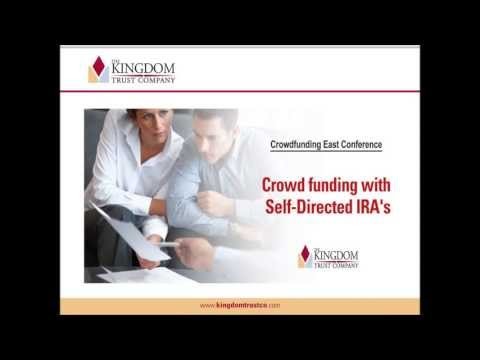Crowdfunding in a SelfDirected IRA
Post on: 11 Июль, 2015 No Comment

Crowdfunding is extremely hot right now in the investing world, and with good reason. Since 2010, crowdfunding platforms have helped individuals, groups and companies raise an estimated $9.3 billion from public funding. With an average of 470 projects being added each day, crowdfunding has clearly caused a disruptive shift in the way the people think about financing.
And with the passage of the Jumpstart Our Business Startups (JOBS) Act in 2012, the crowdfunding wave has had a particularly big impact on the operations of small businesses and privately held companies groups that have historically struggled to raise capital. The JOBS Act lifted the general solicitation ban, allowing startups to publically advertise they theyre seeking investments. And what better way to do that than use a crowdfunding platform?
As you can imagine, crowdfunding is also growing in popularity among PENSCOs self-directed IRA account holders. Since self-directed IRAs allow people to invest tax-advantaged dollars in alternative assets, private equity is an attractive option for a lot of our clients. The proliferation of crowdfunding platforms has made it easier to find deals, but in some ways a bit more complicated in terms of understanding the logistics and rules. To help investors navigate this emerging landscape, we recently held a free webinar with the founders of two crowdfunding portals: CircleUp and HealthiosXchange. You can check out the replay here .
The webinar gave a great overview of crowdfunding for investors, covering everything from the basics to more complex regulatory issues and investing considerations. Heres a sneak peek at the highlights:
- Crowdfunding defined. Crowdfunding is the process of aggregating small individual contributions to meet the larger financial goal of an organization, group or individual. There are three main categories within the crowdfunding umbrella: donation-based platforms like Kickstarter, debt-based or peer-to-peer lending companies such as Lending Club and equity-based companies like CircleUp and HealthiosXchange .
- Why equity-based crowdfunding? Equity-based crowdfunding allows investors to actually receive equity in the business they choose to back (unlike a donation-based platform like Kickstarter, which repays investors with perks and goodwill). It work similarly to traditional private placements, but the advantage is that investors can find a much wider array of opportunities using these platforms.
- JOBS Act impact. As I mentioned before, the JOBS Act opened up crowdfunding to startups and entrepreneurs, but because equity-based crowdfunding platforms are monitored by the SEC and FINRA, there are still limits on how those groups can use the strategy. For one thing, currently all startup investors must be accredited. As for the future, there are major uncertainties around how the SEC will continue to define the rules set out by the JOBS Act. Can the SEC create regulations that make it attractive for companies while still protecting investors? Will state regulation be completely removed? Time will tell and we expect to hear regulations regarding non-accredited investors by the end of this summer.
- Investors and companies benefit. Meanwhile, equity-based crowdfunding continues to bear fruit for both startups and investors. On the company side, crowdfunding provides a way to raise capital at a lower cost than the more traditional methods, for example through broker dealers who frequently charge between 3 5% for a raise. Funding portals often charge half as much. On the investor side, crowdfunding platforms open up a world of options that would have seemed impossible only a few short years ago.
And with a self-directed IRA, investors can use their tax-advantaged retirement dollars to invest in the deals they find on these crowdfunding platforms. Want to know if crowdfunding in your IRA is the right move for you? PENSCO can help give us a call at 866-818-4472 or check out our website for more info.
This Blog does not provide investment, tax, or legal advice nor does it evaluate, recommend or endorse any advisory firm or investment vehicle. Investments are not FDIC insured and are subject to risk, including the loss of principal.
Please enable JavaScript to view the comments powered by Disqus.














